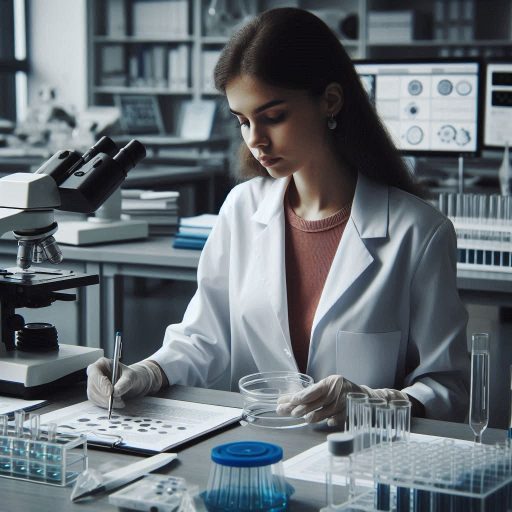Introduction
Microbiologists study microorganisms, including bacteria, viruses, fungi, and parasites.
They investigate how these tiny organisms affect humans, animals, and the environment.
Their work is crucial in many industries, including healthcare, pharmaceuticals, agriculture, and food production.
Microbiologists develop vaccines, conduct research, and ensure food safety.
They also play a vital role in environmental protection by monitoring microbial communities.
The importance of microbiologists continues to grow as global health challenges and environmental issues increase.
For instance, the COVID-19 pandemic highlighted the need for microbiologists in vaccine development and infectious disease control.
Additionally, the rising concerns about food safety and antibiotic resistance have heightened the demand for these experts.
Job outlook for microbiologists appears promising.
The U.S. Bureau of Labor Statistics projects a growth rate of 5% from 2021 to 2031.
This growth is driven by advances in biotechnology and the expanding need for microbiological research.
Career opportunities are also increasing in academic research, government laboratories, and private industries.
Aspiring microbiologists can enhance their career prospects through education and specialized training.
A bachelor’s degree in microbiology or a related field is essential, while advanced degrees offer greater opportunities.
Networking and internships can further strengthen candidates‘ profiles in this competitive field.
As industries evolve, microbiologists will remain crucial to addressing health and environmental challenges.
Job Duties of a Microbiologist
Microbiologists play a crucial role in various industries, including healthcare, pharmaceuticals, and agriculture.
They focus on studying microorganisms like bacteria, viruses, fungi, and parasites.
Their work significantly impacts public health, environmental safety, and product development.
Below are some of the primary job duties that microbiologists undertake.
Conducting Research to Study Microorganisms
Microbiologists conduct extensive research to understand microorganisms’ behavior, characteristics, and effects on humans and the environment.
They design and execute experiments to isolate, identify, and study these tiny organisms.
This research often helps develop new antibiotics and vaccines.
Microbiologists also explore microorganisms’ roles in nutrient cycling and bioremediation.
Their findings contribute to advancements in medicine and environmental science.
Analyzing and Interpreting Data
Data analysis is a critical part of a microbiologist’s job.
They collect data from experiments and field studies, using advanced techniques and equipment.
Microbiologists employ statistical methods to evaluate their findings.
This process helps them draw meaningful conclusions about microorganisms’ functions and impacts.
They also prepare reports and presentations based on their analyses.
Communicating results to colleagues and stakeholders is essential for advancing scientific knowledge and decision-making.
Developing New Products and Technologies
Microbiologists often engage in product development, focusing on creating innovative solutions.
They collaborate with other scientists and engineers to develop new technologies.
This can include creating probiotics for digestive health or biofertilizers for agriculture.
Microbiologists also work on developing diagnostic tools for identifying infectious diseases.
Their expertise helps industries improve existing products and processes, enhancing efficiency and effectiveness.
Ensuring Safety and Quality Control Measures are Met
Ensuring safety and quality is a vital responsibility for microbiologists.
They monitor laboratory practices to comply with safety regulations and protocols.
Microbiologists conduct tests to detect harmful microorganisms in food and water.
Their work ensures that products meet quality standards before reaching consumers.
By implementing stringent quality control measures, they protect public health and the environment.
In review, microbiologists have diverse and impactful job duties.
They conduct research, analyze data, develop new products, and ensure safety.
Their work contributes to various fields, from healthcare to environmental science.
As they continue to explore the microscopic world, they play a vital role in advancing science and technology.
The demand for skilled microbiologists is expected to grow, making this an exciting and rewarding career path.
Read: U.S. Cities with the Most Opportunities for Environmental Scientists
Educational Requirements
To become a successful microbiologist, education plays a crucial role.
Most entry-level positions require at least a bachelor’s degree in microbiology or a related field.
Students pursuing this degree should focus on biology, chemistry, and biochemistry.
Many universities offer specialized programs tailored for aspiring microbiologists.
Bachelor’s Degree in Microbiology or Related Field
Undergraduate programs often include laboratory courses, which provide hands-on experience.
This experience is invaluable for understanding microbial techniques and practices.
Students learn to conduct experiments, analyze data, and draw conclusions.
They also gain skills in using laboratory equipment and safety protocols.
Such training equips graduates with essential skills for the workforce.
Advanced Degrees for Higher-Level Positions
While a bachelor’s degree opens doors, advanced degrees can enhance career prospects.
Many employers prefer candidates with a master‘s or doctoral degree.
Advanced degrees allow microbiologists to specialize in areas such as clinical microbiology, environmental microbiology, or industrial microbiology.
This specialization often leads to higher-level positions and increased responsibilities.
Microbiologists with advanced degrees frequently engage in research and development.
They might work in academic institutions, government agencies, or private industries.
These roles often require strong analytical skills and the ability to manage complex projects.
Furthermore, individuals with a Ph.D. can pursue academic careers, teaching future microbiologists.
Continuing Education and Certifications to Stay Current in the Field
Continuing education is vital in the ever-evolving field of microbiology.
Technologies and methods continue to advance, making ongoing learning essential.
Microbiologists must stay updated on the latest research findings and techniques.
Many professional organizations offer workshops, webinars, and conferences.
Participating in these events helps professionals remain informed about industry trends.
Certifications also enhance a microbiologist’s credentials.
Various organizations offer specialized certifications that demonstrate expertise in specific areas.
For instance, the American Society for Microbiology provides certification programs.
These programs validate a microbiologist’s skills and knowledge, making them more competitive in the job market.
Employers often seek candidates with additional certifications in laboratory management or bioinformatics.
These certifications showcase a commitment to professional growth and can lead to advancement opportunities.
Moreover, continuing education fosters networking opportunities.
Professionals can connect with peers, share knowledge, and collaborate on projects.
In essence, educational requirements for microbiologists are fundamental to career success.
A bachelor’s degree serves as the foundation, while advanced degrees open doors to specialized roles.
Continuing education and certifications further enhance a microbiologist’s qualifications.
By staying current in the field, microbiologists can ensure career growth and contribute significantly to scientific advancements.
Embracing lifelong learning is essential for thriving in this dynamic profession.
Read: Environmental Scientist vs. Ecologist: Roles and Differences in the US
Job Outlook for Microbiologists
Expected Growth in Job Opportunities Due to Increasing Demand
The job outlook for microbiologists remains promising, driven by several key factors.
A growing awareness of microbiology’s role in health and disease fuels this demand.
The ongoing emphasis on research and development in pharmaceuticals enhances opportunities for microbiologists.
As more organizations invest in this field, job openings will likely increase.
Opportunities in Pharmaceuticals, Healthcare, Research Institutions, and Government Agencies
Microbiologists can find abundant opportunities in various sectors.
The pharmaceutical industry consistently seeks skilled professionals for drug development and testing.
Here, microbiologists contribute to creating effective medications and ensuring their safety.
This sector offers a wide range of roles, from laboratory work to quality assurance positions.
In healthcare, microbiologists play a critical role in diagnosing and treating infections.
Hospitals and clinical laboratories employ them to conduct tests and analyze samples.
These professionals help identify pathogens and guide treatment decisions.
As the healthcare sector expands, the demand for microbiologists will continue to rise.
Research institutions also present significant opportunities for microbiologists.
Universities and private research organizations often seek individuals with specialized skills.
These professionals conduct vital research on microbial behavior, antibiotic resistance, and vaccine development.
This work is essential in addressing global health challenges.
Government agencies also employ microbiologists to monitor public health.
Organizations like the Centers for Disease Control and Prevention (CDC) and the Environmental Protection Agency (EPA) rely on these experts.
Microbiologists contribute to disease control efforts, environmental monitoring, and food safety initiatives.
Their work helps protect public health and the environment.
Competition for Jobs in Certain Sectors
Despite the positive outlook, competition for microbiologist positions can be intense, particularly in certain sectors.
Many candidates possess advanced degrees, making it essential for job seekers to stand out.
Gaining relevant experience through internships, volunteer work, or research projects can enhance a candidate’s appeal.
Networking within professional organizations also helps individuals connect with potential employers.
Moreover, candidates with specialized skills in areas like bioinformatics or microbial genetics may have a competitive edge.
As the field of microbiology continues to evolve, adapting to new technologies and methodologies is crucial.
Continuous learning and skill development will be vital for career growth.
In general, the job outlook for microbiologists appears bright.
The increasing demand in pharmaceuticals, healthcare, research, and government sectors creates numerous opportunities.
While competition exists in specific areas, candidates who pursue continuous learning and build relevant experience can thrive.
With a commitment to advancing their skills and knowledge, microbiologists can contribute significantly to public health and scientific progress.
Read: The Relationship Between U.S. Policy & Environmental Scientist Roles
Salary Potential and Benefits
Microbiologists enjoy competitive salary potential and valuable benefits in their careers.
The average salary range for microbiologists varies depending on experience, education, and location.
According to the Bureau of Labor Statistics, the median annual wage for microbiologists was approximately $82,000 in 2022.
This figure can increase significantly with experience and advanced education.
Entry-level positions typically start at around $50,000, while those with more experience can earn upwards of $100,000 annually.
Average Salary Range for Microbiologists
Microbiologists who pursue specialized roles can see even higher salaries.
For instance, clinical microbiologists, environmental microbiologists, and pharmaceutical microbiologists often command premium pay due to their expertise.
Additionally, those who move into management positions can experience substantial salary growth.
Management roles involve overseeing laboratory operations, guiding research projects, and mentoring junior staff.
These responsibilities often come with increased compensation and added bonuses.
Potential for Higher Salaries in Management or Specialized Roles
Geographic location also plays a crucial role in salary potential.
States with high demand for microbiologists, such as California and Massachusetts, often offer salaries above the national average.
Urban areas tend to provide more job opportunities and higher wages than rural regions.
This discrepancy allows microbiologists to choose locations that align with their career goals and financial expectations.
Benefits such as Health Insurance, Retirement Plans, and Job Stability
In addition to competitive salaries, microbiologists enjoy a range of benefits.
Most employers provide health insurance, retirement plans, and paid time off.
Comprehensive health insurance covers medical expenses, ensuring access to necessary care.
Retirement plans, such as 401(k) options, help microbiologists save for their future.
Many employers offer matching contributions, further enhancing retirement savings.
Job stability is another significant benefit of a career in microbiology.
The demand for microbiologists is projected to grow by 5% from 2022 to 2032, which is faster than the average for all occupations.
This growth is driven by the increasing need for research in healthcare, pharmaceuticals, and environmental protection.
Microbiologists play a vital role in developing new drugs, vaccines, and sustainable practices.
Their expertise is essential in addressing public health concerns and environmental challenges.
Many microbiologists also have opportunities for professional development.
Employers often support continuing education, offering tuition reimbursement or funding for workshops and conferences.
This investment in employee growth not only enhances skills but also increases job satisfaction and career advancement potential.
In a nutshell, microbiologists benefit from a favorable salary outlook and robust benefits.
Their earning potential increases with experience, specialization, and management roles.
Additionally, employers provide health insurance, retirement plans, and stability in a growing field.
With the right education and experience, microbiologists can achieve rewarding careers that offer both financial and personal satisfaction.
Transform Your Career Today
Unlock a personalized career strategy that drives real results. Get tailored advice and a roadmap designed just for you.
Start NowRead: Organizations & Associations for Environmental Scientists in the USA

Career Growth Opportunities for Microbiologists
The field of microbiology offers significant career growth opportunities.
Microbiologists can advance to supervisory or managerial roles.
These positions involve overseeing lab operations and managing teams.
Individuals with strong leadership skills often excel in these roles.
They ensure that research projects align with organizational goals.
Advancement to Supervisory or Managerial Roles
Advancement to supervisory or managerial roles is a key growth opportunity.
In these positions, microbiologists oversee laboratory activities.
They manage staff and ensure compliance with safety regulations.
Successful leaders in microbiology contribute to strategic planning.
They also mentor junior staff, fostering a collaborative environment.
This leadership experience enhances their professional profiles.
Many organizations value those who can lead effectively.
Opportunities for Specialization
Specialization presents another path for career advancement.
Microbiologists can focus on areas such as medical microbiology.
Medical microbiologists study pathogens and disease mechanisms.
Their expertise is crucial in hospitals and research institutions.
Environmental microbiology is another specialization option.
Professionals in this field study microorganisms in natural environments.
They assess their impacts on ecosystems and human health.
Food microbiology also offers career paths.
Specialists analyze food safety and quality.
They develop methods to prevent contamination and ensure public health.
These specialized roles often lead to advanced positions in research and industry.
Possibility of Becoming a Consultant or Starting a Private Practice
As microbiologists gain experience, they may choose to become consultants.
Consulting provides flexibility and the chance to work with diverse clients.
Consultants offer their expertise to various organizations.
They advise on best practices and regulatory compliance.
This career path often allows for higher earning potential.
Starting a private practice is another exciting option.
Some microbiologists choose to establish their own labs.
They can provide diagnostic services or conduct specialized research.
This path requires business acumen and an understanding of the industry.
However, it can be rewarding both personally and financially.
Continuing Education and Networking
Continuing education plays a vital role in career advancement.
Microbiologists should pursue certifications and attend workshops.
Professional organizations offer resources for networking and skill development.
These opportunities help microbiologists stay current in their field.
Many universities and institutions provide advanced degrees.
A master‘s or Ph.D. can enhance job prospects.
Advanced education opens doors to leadership roles in research and academia.
Networking is crucial for career growth.
Microbiologists should connect with professionals in their field.
Attending conferences allows them to meet industry leaders.
These connections can lead to job opportunities and collaborations.
Engaging in research projects with other professionals can expand expertise.
Job Outlook
The job outlook for microbiologists remains strong.
As society faces new challenges, such as infectious diseases, their expertise is vital.
Organizations increasingly seek professionals who can analyze complex microbial interactions.
The demand for skilled microbiologists will likely continue to grow.
Microbiologists have various career growth opportunities.
Advancement to supervisory roles, specialization, and consulting are all viable paths.
Those who actively seek out these opportunities can build rewarding careers.
By investing in education and networking, microbiologists can shape their professional futures.
Skills and Qualities Required for Microbiologists
Microbiologists play a crucial role in various fields, including healthcare, pharmaceuticals, and environmental science.
To excel in this profession, specific skills and qualities are essential.
Here are four key competencies that every microbiologist should possess:
Strong Analytical and Problem-Solving Skills
Microbiologists must have strong analytical skills to evaluate complex data.
They often work with intricate experimental designs, requiring careful analysis of results.
Problem-solving skills are equally important, as microbiologists frequently encounter unexpected issues.
They need to devise innovative solutions quickly to ensure research progress.
A microbiologist’s ability to think critically helps them interpret findings and draw valid conclusions.
Attention to Detail and Accuracy
Attention to detail is vital in microbiology, where even minor errors can lead to significant consequences.
Microbiologists must meticulously follow protocols to ensure experimental accuracy.
They regularly document their findings to maintain reliable records for future reference.
A small oversight can compromise the integrity of their research.
Precision in laboratory techniques can greatly affect results, making accuracy an indispensable quality for success.
Communication and Teamwork Abilities
Effective communication skills are essential for microbiologists who work in collaborative environments.
They often need to explain complex concepts to colleagues and stakeholders.
Clear communication helps in sharing research findings and fostering teamwork.
Many projects require collaboration with professionals from various disciplines.
Microbiologists must articulate their ideas clearly to ensure everyone is on the same page.
Strong teamwork abilities facilitate smoother project execution and enhance problem-solving efforts.
Adaptability to Evolving Technologies and Methodologies
The field of microbiology is continually evolving, with new technologies emerging regularly.
Microbiologists must stay updated on the latest advancements in their field.
This adaptability is crucial for incorporating innovative techniques into their research.
Embracing new methodologies allows microbiologists to enhance their experimental approaches.
They should also be open to learning new software and tools that improve data analysis and laboratory efficiency.
To sum it all up, a successful career in microbiology demands a combination of analytical skills, attention to detail, effective communication, and adaptability.
As the field continues to grow, professionals must develop these qualities to thrive.
Employers increasingly seek microbiologists who can navigate complex problems and work collaboratively.
Those who cultivate these skills will find themselves well-prepared for the future job market.
With continuous advancements in science and technology, the demand for skilled microbiologists will likely increase.
By honing these essential skills, aspiring microbiologists can enhance their career prospects and contribute meaningfully to their chosen fields.
Networking and Professional Development
Joining Professional Organizations such as the American Society for Microbiology
Networking and professional development are key to advancing as a microbiologist, and joining organizations like the American Society for Microbiology (ASM) is an excellent starting point.
ASM provides access to exclusive resources like research updates, scientific journals, and networking opportunities.
By becoming a member, you join a global community of microbiologists, allowing you to share knowledge and grow professionally.
Don‘t underestimate the power of professional organizations‘they can open doors to new collaborations and career paths that may not be readily available elsewhere.
Attending Conferences, Workshops, and Seminars
Attending conferences, workshops, and seminars is another valuable way to develop your professional skills and expand your network.
Events like the ASM Microbe conference bring together experts from around the world, offering insights into cutting-edge research.
You‘ll have the chance to attend hands-on workshops that can improve your technical abilities and introduce you to new methodologies.
Each event is a learning opportunity and a platform to connect with industry leaders and peers.
Keep an eye out for these opportunities‘being proactive in your professional development can make a huge difference in your career.
Building a Professional Network Through Collaborations and Partnerships
Collaborations and partnerships are at the heart of scientific progress.
By working with colleagues on research projects, you not only enhance the quality of your work but also build lasting professional relationships.
These connections can lead to exciting new job opportunities and innovative research possibilities.
Social media platforms like LinkedIn make it easier than ever to maintain these relationships and discover new collaborators.
Establishing a strong professional network is a great way to boost your visibility in the field and access unadvertised job openings.
Start small, but be consistent in nurturing those connections‘over time, they can significantly shape your career trajectory.
Essentially, active participation in professional organizations, attendance at industry events, and strategic networking are crucial for microbiologists.
These steps not only enhance your knowledge and skills but also significantly expand your professional connections.
By investing in your professional development, you position yourself for greater success in your career.
Embrace every opportunity to learn and connect, as these experiences will pave the way for a fulfilling and impactful career in microbiology.
Gain More Insights: Latest Advancements in Marine Biology
Conclusion
Microbiologists play a vital role across numerous industries.
Their work impacts healthcare, pharmaceuticals, agriculture, and environmental science.
They conduct essential research that leads to medical advancements and improved public health.
By studying microorganisms, they help develop vaccines, antibiotics, and diagnostic tests.
In agriculture, microbiologists contribute to sustainable practices, enhancing crop yields and soil health.
As industries grow, the demand for skilled microbiologists continues to rise.
This demand translates into abundant job opportunities and career growth.
Graduates in microbiology find diverse roles in research, clinical laboratories, and quality control.
They can also explore positions in regulatory affairs and environmental monitoring.
Pursuing a career in microbiology offers many advantages.
Professionals in this field enjoy stability and the chance to make a difference.
The work of microbiologists is essential in addressing global challenges, such as infectious diseases and food security.
Continuous learning and professional development are crucial for success in microbiology.
Emerging technologies and research constantly reshape the field.
Microbiologists must stay current with advancements to remain competitive.
By engaging in lifelong learning, microbiologists can expand their skill sets and knowledge.
This commitment enhances their career prospects and allows them to contribute effectively to their industries.
In a nutshell, a career in microbiology is rewarding, promising both personal fulfillment and professional success.




